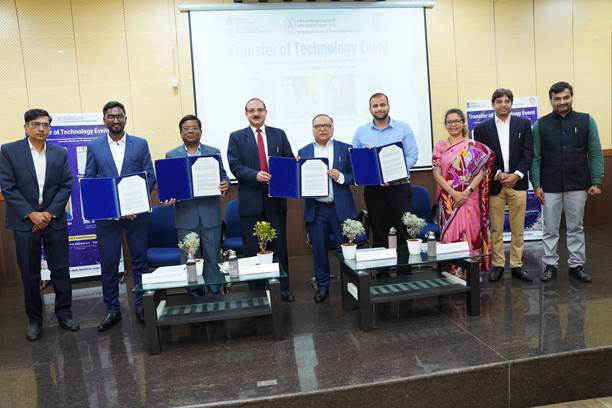Indigenous Silver Nanowire Conductive Ink Technology Transferred to Startups
The indigenous conductive ink technology holds the promise of reducing this dependency, while also enabling India to tap into the rapidly growing demand for advanced electronic materials.

- Country:
- India
A significant milestone in indigenous technological innovation was achieved today at NIT Warangal, where the silver nanowire-based conductive ink technology was transferred to two startups: M/s Chematico Technologies Private Limited, incubated at IIT Ropar, and M/s Vasanthbala Functional Materials Pvt Ltd, incubated at NIT Warangal.
The technology transfer, developed under the aegis of the Ministry of Electronics and Information Technology (MeitY), Govt. of India, and spearheaded by Prof. Sarang Gumfekar (IIT Ropar) and Prof. Shirish Sonawane (NIT Warangal), aims to reduce India's dependency on imported conductive ink and bolster the semiconductor and electronics sectors.
Growing Market Potential
The global market for silver nanowire-based conductive ink and adhesive is projected to surpass $16.87 billion by 2032, driven by rising demand in sectors such as electronics, semiconductors, solar photovoltaics, and RFID technology. Currently, India imports conductive ink worth approximately $1.57 million annually, with major exporters including the USA, China, the Netherlands, the UK, and Taiwan.
The indigenous conductive ink technology holds the promise of reducing this dependency, while also enabling India to tap into the rapidly growing demand for advanced electronic materials.
Applications and Features
Silver nanowire-based conductive ink is a versatile material used in:
- Flexible electronics (e.g., foldable devices, touchscreen displays, computer keyboards).
- Wearable devices and sensors.
- Solar panels and display technologies.
- RFID tags and windshield defrosters.
This innovation provides solutions for circuit repair, electronic packaging, and advanced applications in the semiconductor ecosystem.
Event Highlights
The event was graced by several dignitaries, including:
- Shri Bhuvnesh Kumar, IAS, Additional Secretary and CEO, UIDAI, MeitY, Govt. of India (Chief Guest).
- Smt. Sunita Verma, Group Coordinator, MeitY, GoI.
- Prof. Rajeev Ahuja, Director, IIT Ropar.
- Prof. Bidyadhar Subudhi, Director, NIT Warangal.
- Shri Surendra Gotherwal, Scientist, MeitY, GoI.
Speaking at the event, Shri Bhuvnesh Kumar lauded the transformative potential of the indigenous nanosilver-based conductive ink technology in revolutionizing India's semiconductor and electronics ecosystem.
“This innovation opens doors for advanced applications in flexible electronics, solar photovoltaics, RFID tags, and electronic packaging. Large-scale manufacturing of silver nanowires and conductive ink can significantly reduce India’s dependence on imports and position the country as a global leader in this domain,” he stated.
Future Directions
To scale up the impact of this technology, the Chief Guest encouraged the startups to focus on the mass production of silver nanowires and the domestic manufacturing of conductive ink, which could pave the way for cost-efficient solutions in India's growing semiconductor and electronics industry.
The Directors of IIT Ropar and NIT Warangal emphasized the importance of academia-industry collaboration in driving innovation and self-reliance in technology development.
Conclusion
This landmark event not only underscores India’s commitment to fostering indigenous technologies but also sets the stage for a self-reliant ecosystem in advanced electronic materials. With the backing of government initiatives like MeitY, startups such as Chematico Technologies and Vasanthbala Functional Materials are poised to lead India’s foray into global markets with cutting-edge, homegrown solutions.
- READ MORE ON:
- NIT Warangal
- MeitY










